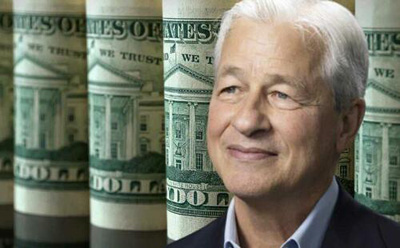JPM CEO Dimon Dumps $140 Million In Shares After Slamming Fed Forecasts
Tyler Durden
 For the first time in his long and tempest-ful tenure at the CEO of JPMorgan, Jamie Dimon has decided the time is right to dump 1 million shares in the mega-bank. For the first time in his long and tempest-ful tenure at the CEO of JPMorgan, Jamie Dimon has decided the time is right to dump 1 million shares in the mega-bank.
According to a regulatory filing Friday, Dimon and his family will dispose of 1 million of the bank's shares, which amounts to around a $140 million haul, and the CEO's "first such stock sale during his tenure at the company."
It has been a great trade as Bloomberg reports, the increase of more than 250% in JPM's shares during Dimon’s tenure has helped turn the executive into a billionaire.
In early 2009, Dimon bought 500,000 shares in the bank as a sign of confidence amid a stock slump. He made an identical move in 2016, spending about $38 million on the two rounds of purchases.
Dimon and his family currently hold about 8.6 million JPMorgan shares, meaning the planned sale would represent less than 12% of their holdings in the New York-based bank. His net worth totals about $2 billion, according to the Bloomberg Billionaires Index.
Of course, Dimon's filing claims this is all pre-planned and being done for tax reasons and diversification (etc., etc.) with the bank reassuring investors in a statement that Dimon "continues to believe the company’s prospects are very strong and his stake in the company will remain very significant."
But, we couldn't help but notice the coincidental timing of the stock sale, just hours after Dimon highlighted the fact that forecasters have missed the mark on their economic outlooks, and there's still reason for caution moving forward.
In a panel at the Future Investment Initiative Summit in Riyadh, Saudi Arabia, the banker called out governments and central banks, and said some more humility should be in order.
"Prepare for possibilities and probabilities, not calling one course of action, since I've never seen anyone call it," Dimon said, per multiple media reports.
"I want to point out the central banks 18 months ago were 100% dead wrong," Dimon added.
"I would be quite cautious about what might happen next year."
Ironically, as Apollo's Torsten Sløk points out in his latest note, it's not just The Fed that is as often as always wrong, the market is also almost always wrong about what the Fed will do beyond the next FOMC meeting.
The market is currently pricing that the FOMC will start cutting rates in June 2024

As Sløk notes, looking at the chart, it is remarkable how mean reverting the error is.
When rates are low, the market is systematically pricing that the Fed will soon hike.
When rates are high, the market is systematically pricing that the next move from the Fed is to cut.
Maybe the Fed will cut rates next summer. Maybe not.
For now, Sløk warns, investors should be planning on rates staying higher for longer.
Does Dimon's stock dump signal his lack of faith in The Fed's ability to pilot the ship through the stagflationary storm ahead?
"Fiscal spending is more than it's ever been in peacetime and there's this omnipotent feeling that central banks and governments can manage through all this stuff," Dimon said.
"I am cautious about what will happen next year."
...or is it all just coincidental timing? Will Dimon 'diversify' away from the dollar into bitcoin? Oh, the irony.
 our mission: our mission:
to widen the scope of financial, economic and political information available to the professional investing public.
to skeptically examine and, where necessary, attack the flaccid institution that financial journalism has become.
to liberate oppressed knowledge.
to provide analysis uninhibited by political constraint.
to facilitate information's unending quest for freedom.
our method: pseudonymous speech...
Anonymity is a shield from the tyranny of the majority. it thus exemplifies the purpose behind the bill of rights, and of the first amendment in particular: to protect unpopular individuals from retaliation-- and their ideas from suppression-- at the hand of an intolerant society.
...responsibly used.
The right to remain anonymous may be abused when it shields fraudulent conduct. but political speech by its nature will sometimes have unpalatable consequences, and, in general, our society accords greater weight to the value of free speech than to the dangers of its misuse.
Though often maligned (typically by those frustrated by an inability to engage in ad hominem attacks) anonymous speech has a long and storied history in the united states. used by the likes of mark twain (aka samuel langhorne clemens) to criticize common ignorance, and perhaps most famously by alexander hamilton, james madison and john jay (aka publius) to write the federalist papers, we think ourselves in good company in using one or another nom de plume. particularly in light of an emerging trend against vocalizing public dissent in the united states, we believe in the critical importance of anonymity and its role in dissident speech. like the economist magazine, we also believe that keeping authorship anonymous moves the focus of discussion to the content of speech and away from the speaker- as it should be. we believe not only that you should be comfortable with anonymous speech in such an environment, but that you should be suspicious of any speech that isn't.
www.zerohedge.com
| 

